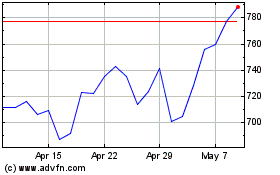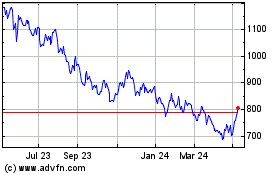Jackson National's Profitable U.K. Divorce -- Heard on the Street
August 27 2020 - 8:01AM
Dow Jones News
By Rochelle Toplensky
Breakups are never easy, but taking time to do it properly can
be better for everyone.
Earlier this month insurer Prudential PLC confirmed plans to
split from its U.S. business Jackson National. Activist investor
Third Point has pushed for a quick breakup, but the London-listed
company is taking its time. That gives investors the chance to buy
in before the shares rerate.
The 172-year old insurer has two main businesses: Jackson
National, which specializes in retirement annuities for Americans;
and a Hong Kong-based business selling health and life insurance
and investments to the growing middle classes in Asia and
eventually Africa. Both are profitable, but incongruously grouped
together as Prudential they appear to fetch a lower valuation than
they might if assessed on their individual merits.
To address this so-called sum-of-the-parts problem, Third Point
pushed for a spinoff of Jackson directly to shareholders.
Prudential instead plans to list the U.S. business through an
initial public offering some time before next summer. It will
retain a stake that can then be sold down gradually.
Low interest rates and regulatory changes have prompted many
insurance companies to split into more focused businesses in recent
years. Prudential has already been through the separation ringer,
having spun off its U.K. investment business M&G last
October.
Jackson specializes in variable annuities, a stock-linked
retirement product that is "extremely complex to analyze,"
according to Third Point. It isn't the only investor to believe the
unit's value isn't reflected in Prudential's share price.
In June, Athene agreed to buy an 11% stake in Jackson for $500
million, which implies a $4.5 billion valuation. Apollo-backed
Athene is an annuities specialist and seen by many as a shrewd
investor. The number also is broadly in line with the valuation
multiple of rivals such as Equitable Holdings and Lincoln National.
That offers reassurance that Jackson is indeed worth more than
Prudential's stock price implies, but the shares haven't rerated
since the news.
Jackson isn't expected to need additional capital: Its
regulatory risk-based capital solvency ratio was within the IPO
target range at the end of June. It is likely to issue debt up to
Pru's target leverage range of 20% to 25%, but won't pay dividends
until after the listing.
The breakup could prompt a re-evaluation of Prudential's
Asia-based insurance business too. According to Chief Executive
Mike Wells, "every dollar of capital invested organically in Asia
new business created nearly six dollars of value." Third Point
argued the business is "materially undervalued" and UBS sees upside
of about 15%. Shares in AIA, a similar business, trade for 19 times
prospective earnings, compared with just nine times for
Prudential's stock.
To be sure, the IPO plan could be delayed by a second wave of
the pandemic or other market disruption. Pru's Asian growth
prospects, which are mainly focused on emerging markets like India
and Indonesia as well as mainland China and the troubled city of
Hong Kong, could also stall.
Yet a better valuation for Jackson doesn't depend on Asia, and
the IPO plans are in place. Reassuringly, Mr. Wells has done this
before. Divorces usually only make lawyers richer, but Prudential's
is one from which investors could also benefit.
Write to Rochelle Toplensky at rochelle.toplensky@wsj.com
(END) Dow Jones Newswires
August 27, 2020 07:46 ET (11:46 GMT)
Copyright (c) 2020 Dow Jones & Company, Inc.
Prudential (LSE:PRU)
Historical Stock Chart
From Mar 2024 to Apr 2024

Prudential (LSE:PRU)
Historical Stock Chart
From Apr 2023 to Apr 2024
